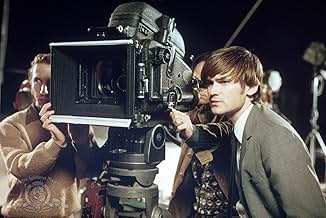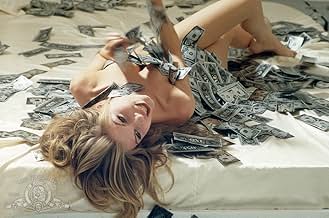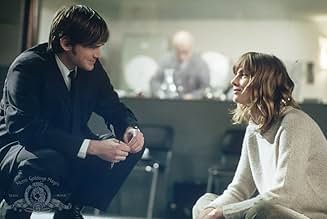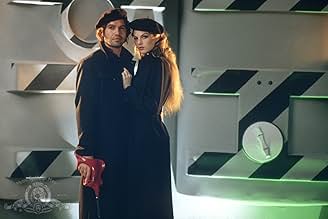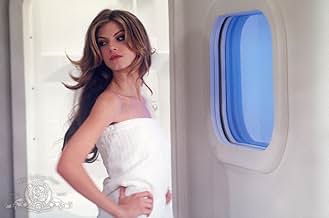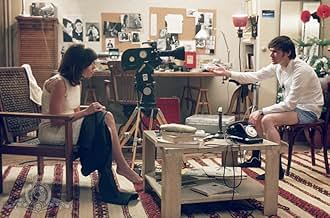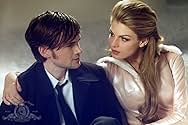CALIFICACIÓN DE IMDb
6.2/10
5.2 k
TU CALIFICACIÓN
Un joven cineasta hace malabares con la dirección de una cursi película de ciencia ficción, mientras se enfrenta a la relación con su novia que se desmorona.Un joven cineasta hace malabares con la dirección de una cursi película de ciencia ficción, mientras se enfrenta a la relación con su novia que se desmorona.Un joven cineasta hace malabares con la dirección de una cursi película de ciencia ficción, mientras se enfrenta a la relación con su novia que se desmorona.
- Premios
- 1 nominación en total
- Dirección
- Guionista
- Todo el elenco y el equipo
- Producción, taquilla y más en IMDbPro
Opiniones destacadas
CQ (2002) *** Jeremy Davies, Angela Lindvall, Elodie Bouchez, Gerard Depardieu, Giancarlo Giannini, Massimo Ghini, John Phillip Law, Jason Schwartzman, Dean Stockwell, Billy Zane. Filmmaker Roman Coppola proves to be a chip off the old block (his dad is Francis Ford, duh!) with this sweetly dark comic valentine to foreign films of France and Italy focusing on a struggling film editor/auteur wannabe (Davies in all his squirmy, milquetoasty glory) assigned to a disastrous sci-fi B flick where he winds up being a replacement director and falls deeply in love with his gorgeous starlet (Lindvall, the epitome of sex echoing the leonine good looks of Catherine Deneuve at her start) in the process. Coppola has a keen technical sense incorporating set and production design, costumes, camerawork, editing and low-key acting to make a picture perfect ode to the hurly-burly world of filmmaking then and now. If there is a criticism it is that it is a bit slight in its theme (filmmaker's navel gazing fails to see the big picture: love is all around) yet there's a nice homage to Coppola's relationship with his famous father in the interplay between Davies and his onscreen father Stockwell, an absent-minded businessman, echoing nicely. The title is a play on Seek You = CQ.
Folks, I really, really wanted to like this film. Alas, I found myself looking at the DVD's timer, wondering when the thing would end. So many elements are likable: groovy sixties design, groovy music, groovy chicks, groovy references to (truly) groovy sixties flicks with chicks. But it doesn't hold together. It doesn't flow. It doesn't involve you.
The self-referential dialog and editing had the cloying and self-conscious feel of a student film. (And I had to sit through plenty of those in college, including my own ;-)
Overall, I think Roman has promise, but he has a lot of catching up to do with his sister.
The self-referential dialog and editing had the cloying and self-conscious feel of a student film. (And I had to sit through plenty of those in college, including my own ;-)
Overall, I think Roman has promise, but he has a lot of catching up to do with his sister.
This film is entertaining, thoughtful and beautifully photographed, It cleverly mixes documentary with the real lives of it's characters giving a new twist to the "story within a story" genre. Every actor gives an honest performance in a story that could have easily slipped into the same old tortured artist crap that seems so popular in film today. The soundtrack is very much a part of the story in that it represents the era in which the film is set and the style in which the film within the film is set. Roman Coppola may be Francis' son but he is not a copycat.
I admit I was just going to see this film for the close-ups of my favorite actor Billy Zane because its been far too long since I've seen his face on the big screen. However, the film was actually well done and had an interesting 60's tone which is pulled off very well. But the one thing that bothered me was why the title "CQ" ? It had one brief reference to CQ > seeks you but not enough to name a whole movie after it. Anyway, Billy did a good job and was very entertaining so for all you Billy fans, go see CQ if you can find it playing near you.
(Note: Over 500 of my movie reviews are now available in my book "Cut to the Chaise Lounge or I Can't Believe I Swallowed the Remote!" Get it at Amazon.)
There are two films within a film in this campy debut from Roman Coppola. There is the introspective black and white, experimental, "student" sort of film that the young director Paul (Jeremy Davies) is making in his Paris apartment, and there is "Dragonfly," a kind of Barbarella (1968) sci-fi space shoot 'em up that he ends up directing. These might be seen as the twin realities of the young film maker: on the one hand there are those short films you made at USC or UCLA film school to get your degree; on the other, there are those mindless commercial entertainments that Hollywood needs to crank out for the masses. These represent the bookends of the young director's reality.
The third film, the film that exists over and above these two, is the film that Roman/Paul would like to make, a film about what it is like to be a young film maker amid the crass commercialism of the producers, the seductive lure of the glamor that is the film maker's world, and the daily often tedious work of the actual film making. In other words, Roman Coppola is self-exploring in public. He is the novelist as a film maker.
"Dragonfly" itself is indeed Barbarella without the benefit of Terry Southern's contributions to the script or the services of Jane Fonda. It is unconsciously campy and a satire on such films. Model Angela Lindvall, five feet ten and three-quarters inches tall, anorexically thin, and sporting some very serious hair, plays Dragonfly with a kind of Barbie doll intensity. It is immediately obvious that she has the muscle tone of the languid and the athletic ability of a preteen. Yet her character is a "for hire" secret agent skilled in the martial arts and the use of weapons. Playing opposite her is Billy Zane as "Mr. E" a kind of Che Guevara revolutionary who is absurdly stationed on the far side of the moon where he is training revolutionaries.
In the introspective black and white film, Paul sits on the commode and talks to the camera much to the disdain of his live-in girlfriend Marlene (French actress Elodie Bouchez, best known for her work in the outstanding The Dreamlife of Angels (1998)) who would like him to pay more attention to her.
This might be compared (distantly) with Francois Truffaut's La Nuit Américaine (Day for Night) from 1973 in which the great French director plays himself making a film--in other words a film within a film. Jeremy Davies reminds me somewhat of the sensitive, boyish actor Jean-Pierre Leaud, who played in that film after gaining prominence in Truffaut's Les Quatre cents coup (1959). It is easy to see Truffaut's influence on Roman Coppola, as indeed Truffaut has influenced many directors.
I don't think CQ ("Seek You") was entirely successful mainly because I don't think Roman made the transition from the self-indulgence and showiness characteristic of the very films he is satirizing to the mature project that addresses itself more directly to the needs of the audience. There is some fancy camera work with mirrors and characters seen from interesting angles, and some beautifully constructed sets, and some witty dialogue amid some telling satire of filmland people and their world (especially producer Enzo played by Giancarlo Giannini and Dragonfly's idiot second director), but we are never made to care about what happens to any of the characters, this despite the fact that Davies is a very sympathetic actor.
Some of the jokes in the film include the three-day five o'clock shadows on the faces of the young actors. (That style is almost contemporary--not sixties-ish.) The hairstyles of the women with the beehives and such hinted of 1969, the year of the main film, but the eye makeup again was more contemporary than sixties-ish since it lacked the very heavy black eyelashes and eye liner that one recalls. To get it right, Roman should have reviewed, e.g., Blow-Up (1966) or Elvira Madigan (1967), films I am sure he has seen. Another is the view of Paris in the year 2001 as seen from 1970. It is futuristic in a silly way, and recalls some science fiction that exaggerated the technological changes that would take place. Orwell's 1984 (from 1948) has not yet arrived, nor has the overpopulated, polluted world from Blade Runner (1982).
Appearing in small roles are Dean Stockwell as Paul's father, and veteran French film star Gerard Depardieu as Dragonfly's original director.
Bottom line: worth seeing if only because it is the first film of the son of Francis Ford Coppola who may yet do something to rival the great works of his father. By the way, this might also be compared to The Virgin Suicides (2000), his sister Sofia Coppola's first film, just to see who is more likely to best please Dad. I'm taking no bets.
There are two films within a film in this campy debut from Roman Coppola. There is the introspective black and white, experimental, "student" sort of film that the young director Paul (Jeremy Davies) is making in his Paris apartment, and there is "Dragonfly," a kind of Barbarella (1968) sci-fi space shoot 'em up that he ends up directing. These might be seen as the twin realities of the young film maker: on the one hand there are those short films you made at USC or UCLA film school to get your degree; on the other, there are those mindless commercial entertainments that Hollywood needs to crank out for the masses. These represent the bookends of the young director's reality.
The third film, the film that exists over and above these two, is the film that Roman/Paul would like to make, a film about what it is like to be a young film maker amid the crass commercialism of the producers, the seductive lure of the glamor that is the film maker's world, and the daily often tedious work of the actual film making. In other words, Roman Coppola is self-exploring in public. He is the novelist as a film maker.
"Dragonfly" itself is indeed Barbarella without the benefit of Terry Southern's contributions to the script or the services of Jane Fonda. It is unconsciously campy and a satire on such films. Model Angela Lindvall, five feet ten and three-quarters inches tall, anorexically thin, and sporting some very serious hair, plays Dragonfly with a kind of Barbie doll intensity. It is immediately obvious that she has the muscle tone of the languid and the athletic ability of a preteen. Yet her character is a "for hire" secret agent skilled in the martial arts and the use of weapons. Playing opposite her is Billy Zane as "Mr. E" a kind of Che Guevara revolutionary who is absurdly stationed on the far side of the moon where he is training revolutionaries.
In the introspective black and white film, Paul sits on the commode and talks to the camera much to the disdain of his live-in girlfriend Marlene (French actress Elodie Bouchez, best known for her work in the outstanding The Dreamlife of Angels (1998)) who would like him to pay more attention to her.
This might be compared (distantly) with Francois Truffaut's La Nuit Américaine (Day for Night) from 1973 in which the great French director plays himself making a film--in other words a film within a film. Jeremy Davies reminds me somewhat of the sensitive, boyish actor Jean-Pierre Leaud, who played in that film after gaining prominence in Truffaut's Les Quatre cents coup (1959). It is easy to see Truffaut's influence on Roman Coppola, as indeed Truffaut has influenced many directors.
I don't think CQ ("Seek You") was entirely successful mainly because I don't think Roman made the transition from the self-indulgence and showiness characteristic of the very films he is satirizing to the mature project that addresses itself more directly to the needs of the audience. There is some fancy camera work with mirrors and characters seen from interesting angles, and some beautifully constructed sets, and some witty dialogue amid some telling satire of filmland people and their world (especially producer Enzo played by Giancarlo Giannini and Dragonfly's idiot second director), but we are never made to care about what happens to any of the characters, this despite the fact that Davies is a very sympathetic actor.
Some of the jokes in the film include the three-day five o'clock shadows on the faces of the young actors. (That style is almost contemporary--not sixties-ish.) The hairstyles of the women with the beehives and such hinted of 1969, the year of the main film, but the eye makeup again was more contemporary than sixties-ish since it lacked the very heavy black eyelashes and eye liner that one recalls. To get it right, Roman should have reviewed, e.g., Blow-Up (1966) or Elvira Madigan (1967), films I am sure he has seen. Another is the view of Paris in the year 2001 as seen from 1970. It is futuristic in a silly way, and recalls some science fiction that exaggerated the technological changes that would take place. Orwell's 1984 (from 1948) has not yet arrived, nor has the overpopulated, polluted world from Blade Runner (1982).
Appearing in small roles are Dean Stockwell as Paul's father, and veteran French film star Gerard Depardieu as Dragonfly's original director.
Bottom line: worth seeing if only because it is the first film of the son of Francis Ford Coppola who may yet do something to rival the great works of his father. By the way, this might also be compared to The Virgin Suicides (2000), his sister Sofia Coppola's first film, just to see who is more likely to best please Dad. I'm taking no bets.
¿Sabías que…?
- TriviaAfter being fired, Andrezej puts his fist through the screening room door. This is a reference to Francis Ford Coppola (father of director Roman Coppola) and his short temper. When the editors get a framed section of the destroyed wall, it is actually a portion of a wall the elder Coppola wrecked in his early directing days.
- ErroresIn the tunnel, when Dragonfly swerves in reverse, there already are skid marks on the ground along the path taken by the car's tires.
- ConexionesFeatured in On the Set of 'CQ' (2002)
- Bandas sonorasCe Soir, Je Vais Boire
Lyrics by Gilles Thibaut
Music by Bruno Canfora
Performed by Claude François
Courtesy of Universal International Music, B.V.
Under license from Universal Music Enterprises
Selecciones populares
Inicia sesión para calificar y agrega a la lista de videos para obtener recomendaciones personalizadas
- How long is CQ?Con tecnología de Alexa
Detalles
- Fecha de lanzamiento
- Países de origen
- Sitio oficial
- Idiomas
- También se conoce como
- Агент «Стрекоза»
- Locaciones de filmación
- Productoras
- Ver más créditos de la compañía en IMDbPro
Taquilla
- Presupuesto
- USD 7,000,000 (estimado)
- Total en EE. UU. y Canadá
- USD 414,358
- Fin de semana de estreno en EE. UU. y Canadá
- USD 54,942
- 27 may 2002
- Total a nivel mundial
- USD 499,891
- Tiempo de ejecución1 hora 28 minutos
- Color
- Mezcla de sonido
- Relación de aspecto
- 1.85 : 1
Contribuir a esta página
Sugiere una edición o agrega el contenido que falta



